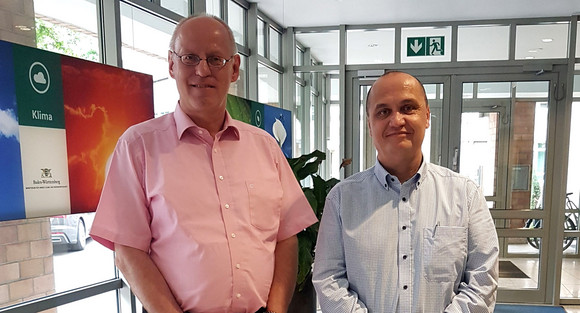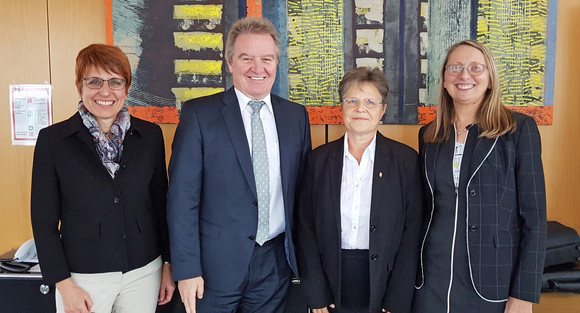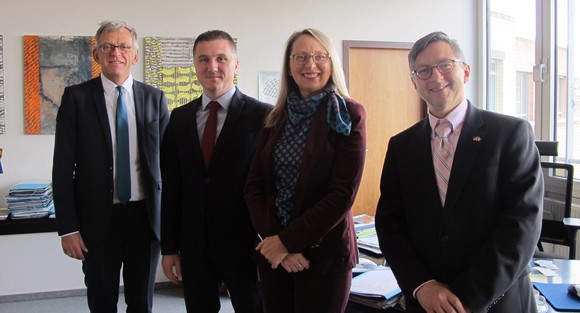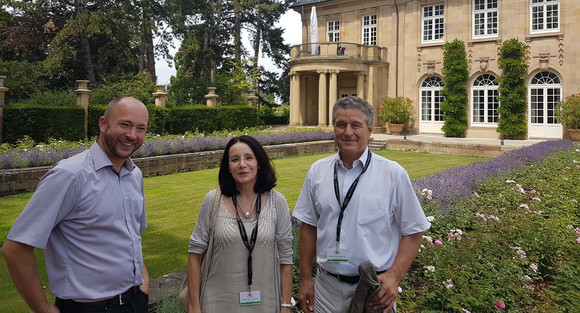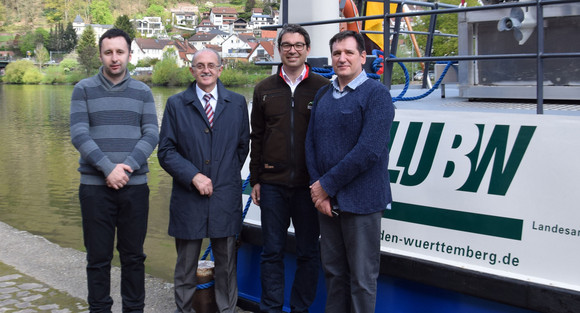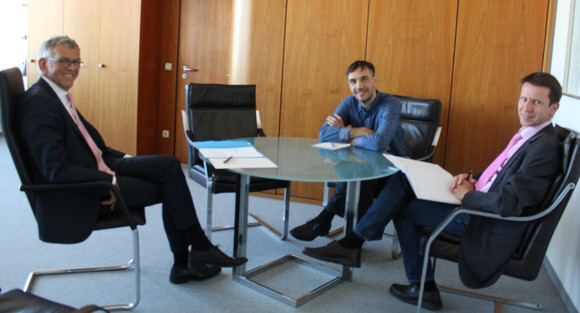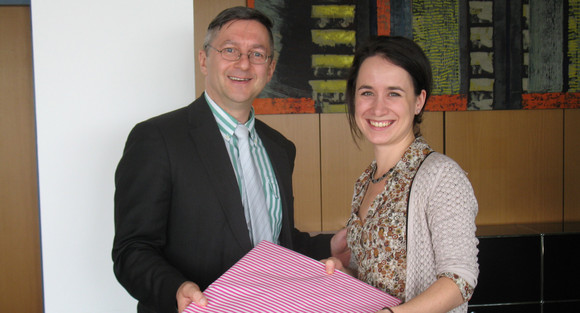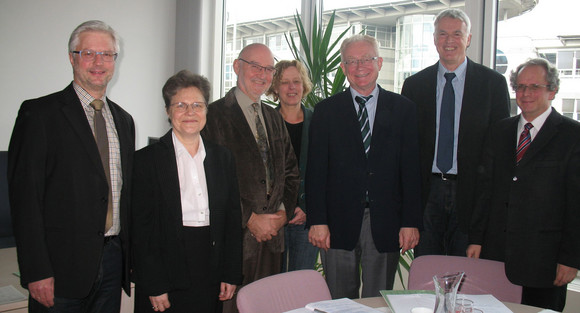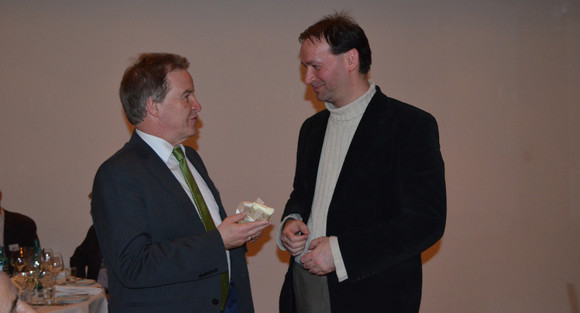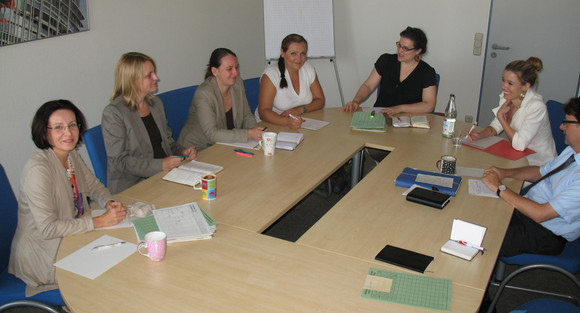The Ministry of the Environment, Climate Protection and the Energy Sector offers an exchange of experts to employees of the various ministries and communal/regional authorities and to experts of the countries along the Danube.
The programmes are tailored to the professional interests of each participant, and include expert discussions and tours relating to relevant topics such as waste water disposal, renewable energy and the energy-efficiency of systems, as well as the opportunity to work in the Ministry’s various departments.
In this way, the exchange of experts creates a strong foundation for future cooperation and common projects. The experiences thus gained can also be helpful for future work in the countries along the Danube. A good command of the German Language is an important requirement for a stay at our Ministry.
Dr.-Ing. Zijah Mahmutspahić, sewage sludge representative of Hrvatske Vode in Zagreb, Croatia, visited Baden-Württemberg from 3 to 5 June 2019 to inform himself about the treatment of sewage sludge. He held talks and visited the wastewater treatment plant Stuttgart-Mühlhausen and the Abwasserzweckverband Offenburg. In Baden-Württemberg sewage sludge is not applied to the fields. In this way pollutants removed from the wastewater do not get back into the food chain. Currently, the sewage sludge is being burned. In the future, Baden-Württemberg aims to reclaim resources (e.g.phoshorus) from sewage sludge. There are already some facilities or they are under construction. The Abwasserzweckverband Offenburg, for example, operates a phosphorus recovery plant.
Gabriella Murányiné Krempels, Head of the Department of Water Management in the Hungarian Ministry of the Interior, visited the Ministry for the Environment, Climate and Energy Sector of Baden-Württemberg from 19 to 23 November 2018 for her second time.
She took part in the Trace Substance Congress 2018 in Heidelberg and held many discussions with experts from the state. She also visited Braunsbach. Parts of Braunsbach were devastated when in May 2016 there were heavy rainfalls. Furthermore, Krempels visited various institutions and sewage treatment plants, for example a teaching and research sewage treatment plant, the Institute for Hydraulic Engineering, Water Quality and Waste Management at the University of Stuttgart (ISWA) and a rain overflow basin.
Miloš Jokić, Assistant Minister for Project Coordination and Development at the Ministry of Spatial Planning, Construction and Environment of the Republic of Srpska (Bosnia and Herzegovina) visited Baden-Württemberg from 26th November to 1st December 2017. The visit took place in the course of the EU Danube Region Strategy. Mr. Jokić received extensive and exciting insights into the topics of waste and energy efficiency.
During his stay, Miloš Jokić held expert discussions with representatives of the Ministry of the Environment, Climate and Energy, the Ministry of Economic Affairs, the KEA Climate Protection and Energy Agency Baden-Württemberg GmbH, the LEEN (Learning Energy Efficiency Networks), the Fraunhofer Institute for Systems and Innovation Research (ISI) and the European Association for Energy Services for Buildings (eu.bac).
The Republic of Srpska is one of two regions of Bosnia and Herzegovina and has existed since the Bosnian War. The republic covers 24,857 km ², which is almost 49% of the territory of Bosnia and Herzegovina and has about 1.5 million inhabitants.
András Szepesi, senior forestry policy advisor in Hungary's Ministry of Agriculture, visited Baden-Württemberg in the week from 3 to 7 July 2017 in the framework of cooperation between the Joinz Government Commission and Hungary and of the EU Strategy for the Danube Region.
In addition to climate change mitigation, Szepesis' responsibilities in the Ministry of Agriculture also include monitoring Hungary's forests, forest research and international cooperation. It was for this reason that, during his visit to Baden-Württemberg, Szepesi was particularly interested in how Baden-Württemberg is responding to climate change, the potential adaptation action it has identified and the aspects of forest management it regards as especially important.
During his shadowing visit András Szepesi talked with representatives from the Ministry of the Environment, Climate Protection and the Energy Sector, the Ministry of Rural Affairs and Consumer Protection, the Forest Research Institute Baden-Württemberg (FVA) in Freiburg, the University of Applied Forest Sciences in Rottenburg and Baden-Württemberg's State Ministry.
The visit by András Szepesi laid the foundations for further cooperation between Baden-Württemberg and Hungary. As well as exchanging views and ideas at the technical level, contacts were also established between Hungary and the state administration in particular.
Zoran Stojanović und Boris B. Novaković: From 9 to 13 April, 2017 Zoran Stojanović and Boris B. Novaković from the Serbian Environmental Protection Agency visited the Max Honsell, the survey ship operated by Baden Württemberg's State Institute for the Environment, Measurements and Nature Conservation (LUBW). As the State of Hesse had given a similar survey ship, the Argus, to the Republic of Serbia, the work shadowing visit and exchange of experience with the ship's crew and experts aboard the Max Honsell was of great importance to the colleagues from Serbia. Baden-Württemberg and Serbia have been working together in the joint government commission for many years.
Zoran Stojanović and Boris B. Novaković discussed ship maintenance, water quality monitoring and various methods of sampling and studying water with the crew of the Max Honsell. The observers also visited the shipyard in Neckarsteinach, where the Max Honsell was refurbished and modernised in 2013/2014.
The LUBW's survey ship, the Max Honsell, monitors the quality of the water in the Rhine and the Neckar. Under the EU Water Framework Directive, regular water samples must be taken. Thanks to the integrated on-board laboratory it is possible to examine biological and chemical samples on site and to send the collected data and readings directly to the LUBW in Karlsruhe. New readings are enriched with results taken from the onboard weather station and with precise position data.
Another important task of the Max Honsell is to arrive on site as quickly as possible in response to pollution or especially critical temperature and oxygen conditions. Samples are used to assess the degree of threat to inland waterways. Biological studies are one of the key tools in the evaluation and implementation of suitable countermeasures.
Dr. Marin Miletić, researcher at Croatia's Energy Institute Hrvoje Pozar in Zagreb, spent 10 days in June 2015 as a guest of the Europe, International Cooperation Department of Baden-Württemberg's Ministry of the Environment, Climate Protection and the Energy Sector. The purpose of Dr. Miletić's stay was to meet partners for bilateral projects between Baden-Württemberg and Croatia and for multilateral projects with other countries in the Danube Region as well as to identify potential sources of funding. During his visit Dr. Miletić was also able to meet the partners of existing projects. Marin Miletić is Croatia's representative in the Environmental Technology Network Danube Region and he was also able to use his time in Baden-Württemberg to carry out additional work in this context. The Ministry of the Environment, Climate Protection and the Energy Sector Baden-Württemberg has adopted a project-focused approach to cooperation with other countries in the framework of the EU Strategy for the Danube Region. The success of these projects depends critically on establishing contacts between potential project partners.
Emma Gothár, a student in the master's programme for International Relations at Andrássy University Budapest, Hungary, completed a two-month internship at the Ministry of the Environment in the Department for European and International Cooperation as part of the Baden-Württemberg Foundation's Walter Hallstein Programme. She worked extensively on the organisational and programme-related preparation of the minister's trip to Serbia and Croatia, as well as on the organisation of the kick-off event of the Baden-Württemberg-Serbian Bio Energy Partnership. During her stay in Stuttgart, she regularly participated in meetings at the Ministry of the Environment and other departments. She thus became well acquainted with Baden-Württemberg's international cooperation, particularly in the environmental area.
Gabriella Murányiné-Krempels, Head of the Sanitary Environmental Engineering and Coordination department at the Hungarian Ministry for Rural Development, spent two weeks as our guest in February 2013. The purpose of her visit was to get to know our technical solutions and legal provisions in the fields of waste water and sewage sludge, and to share experiences from both countries.
Mihajlo Nagy, a lawyer working for Eko-Sustav, a municipal company responsible for waste and renewable energy in the Croatian district of Vukovar-Srijem. Mihaljo Nagy spent a month in the Ministry’s Unit for Europe, International Cooperation. Innovative environmental technologies from Baden-Württemberg were presented in the form of expert discussions and visits to facilities. Mr. Nagy also worked on preparations for a visit by a large delegation from his district to Baden-Württemberg, led by zupan Mr. Bozo Galic (head of district authority).
Matijas Juric, an Engineering graduate who works at the Ministry for the Environment, Climate Protection and the Energy Sector in the Nuclear Power Monitoring department, spent a month at the Energy department of the Croatian Ministry of Economics in April 2013.
Ivana Curkovic, a lawyer working for the Croatian district of Vukovar-Srijem, spent a month working in the Europe, International Cooperation Unit of the Ministry for the Environment, Climate Protection and the Energy Sector in August/September 2012. The job-shadowing reinforced our strong partnership with the district, which was reaf-firmed by a Memorandum of Understanding in December 2012. Ivana worked on preparations for Mr. Untersteller’s trip to Croatia in September 2012, which she also accompanied.

